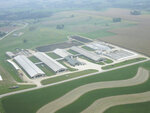

SOUTH WAYNE, Wis. — Jim Winn has a long history of conservation efforts, simply because he believes it is the right thing to do.
First, he helped to form his local farmer-led watershed group, the Lafayette Ag Stewardship Alliance, expanding the conservation efforts to include more farms and more acres.
This led to an active involvement in a pilot sustainability project that is measuring the impact of conservation practices on environmental metrics and farm finances. For his efforts, Winn was named the 2023 Farmer of the Year from Field to Market.
“It’s really neat to be honored like that,” Winn said. “We’re just trying to do what’s right.”
Winn farms near South Wayne with his two partners, Randy Larson and Brian Larson. They operate Cottonwood Dairy, milking 1,700 cows and cropping approximately 2,500 acres.
Winn was inspired to start the watershed group in 2016 to combine the resources of neighboring farms and provide a positive example to the community.
Winn asked three dairy farms from the area to help him establish a group. A couple of other beef, hog and grain farms from the area joined as well. The group has grown to 37 members.
“One of the things I pride myself on with our group is that every year there seems to be more cover crops grown,” Winn said. “It’s really taken off in Lafayette County, and LASA is a big reason for that.”
The head of procurement for Grande Cheese, where Cottonwood Dairy ships its milk, took notice of the group and asked about the impact of the conservation practices LASA was utilizing. The community was also curious, and Winn said he believes food safety is at the top of a consumer’s mind.
Winn partnered with Farmers for Sustainable Food to implement a pilot sustainability project that measures the impact of conservation efforts on environmental metrics. It also provides an opportunity for farmers to understand results so they can better manage their farms and learn from each other.
The project also makes outcomes available to the local community. A free guide shows farmers how to measure their sustainability efforts. These resources can be found on the Farmers for Sustainable Food website.
There has also been support from Southwest Wisconsin Technical College in Fennimore and Houston Engineering in Minnesota to put all the data together.
Together with Lauren Brey, from Farmers for Sustainable Food, the team works with farmers to enroll acres into the program and then document every pass on the enrolled fields. Financial information from a subset of project farms is input into the database as well to provide a snapshot of the profitability of the conservation practices.
This requires information to be entered upfront, an effort that is assisted by Brey and her team, who offer support and one-on-one meetings to help with the workload.
Farms receive scores on biodiversity, energy use, greenhouse gas emissions, land use, soil carbon, soil conservation and water quality. Scores are compared to benchmarks at a project, state and national level, where adequate data exists for farmers to create goals.
“It’s mind-boggling how much data that can come from one little field,” Winn said. “There’s a lot of things we knew we were doing a really good job at, but until we started this sustainability project and they put numbers to it, it’s astonishing what these practices are doing for the environment.”
Reports are produced from each farm and as an aggregate of the whole project. They are entering their fifth year of reporting, with 15 farms concluding positive results so far. Brey said the project has expanded the efforts of the watershed group.
“LASA members have been getting it off the ground and doing an amazing job getting farmers excited about conservation and trying these practices,” Brey said. “But at the end of the day, we didn’t have real numbers around whether we are making an impact on environmental metrics.”
With the numbers in hand, programs are available to help farmers better manage their acres with whatever crop rotations and conservation practices they can prove profitable.
Winn is looking for ways to compensate farmers for the projects they are implementing.
“The consumer demands it, and we want to be a part of the solution,” Winn said. “We should be reimbursed for that.”
Brey said that with Winn at the helm, there is a lot to be hopeful for going forward.
“Jim is such an inspirational leader,” Brey said. “When he is enthusiastic about something, others take notice and join in because he is a light of a leader and has a contagious energy and positivity to bring people together.”
Comments
No comments on this item Please log in to comment by clicking here